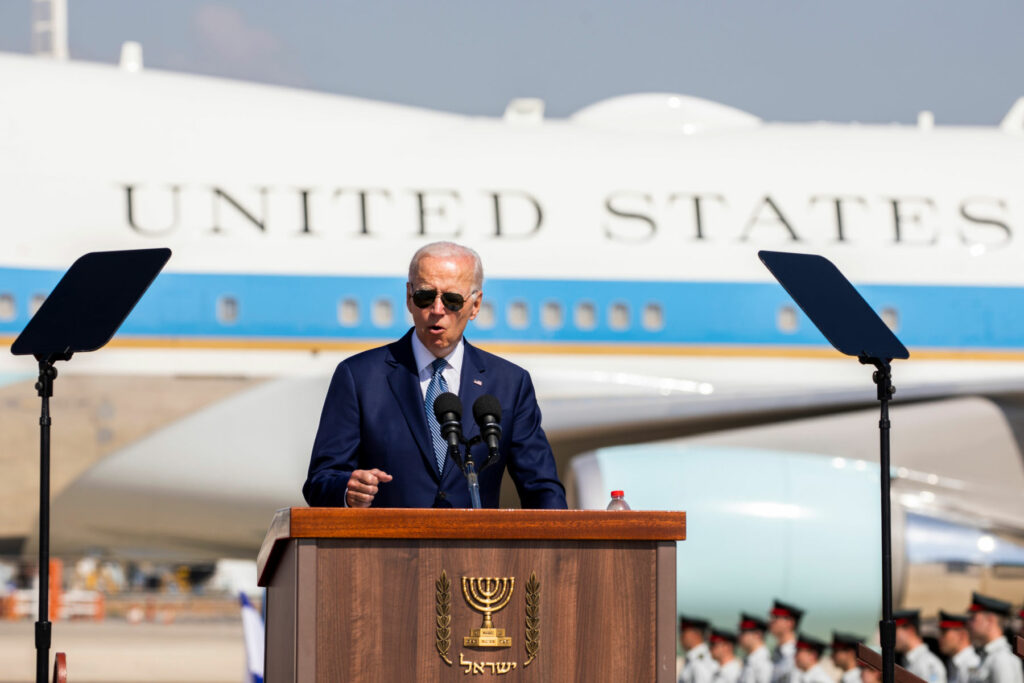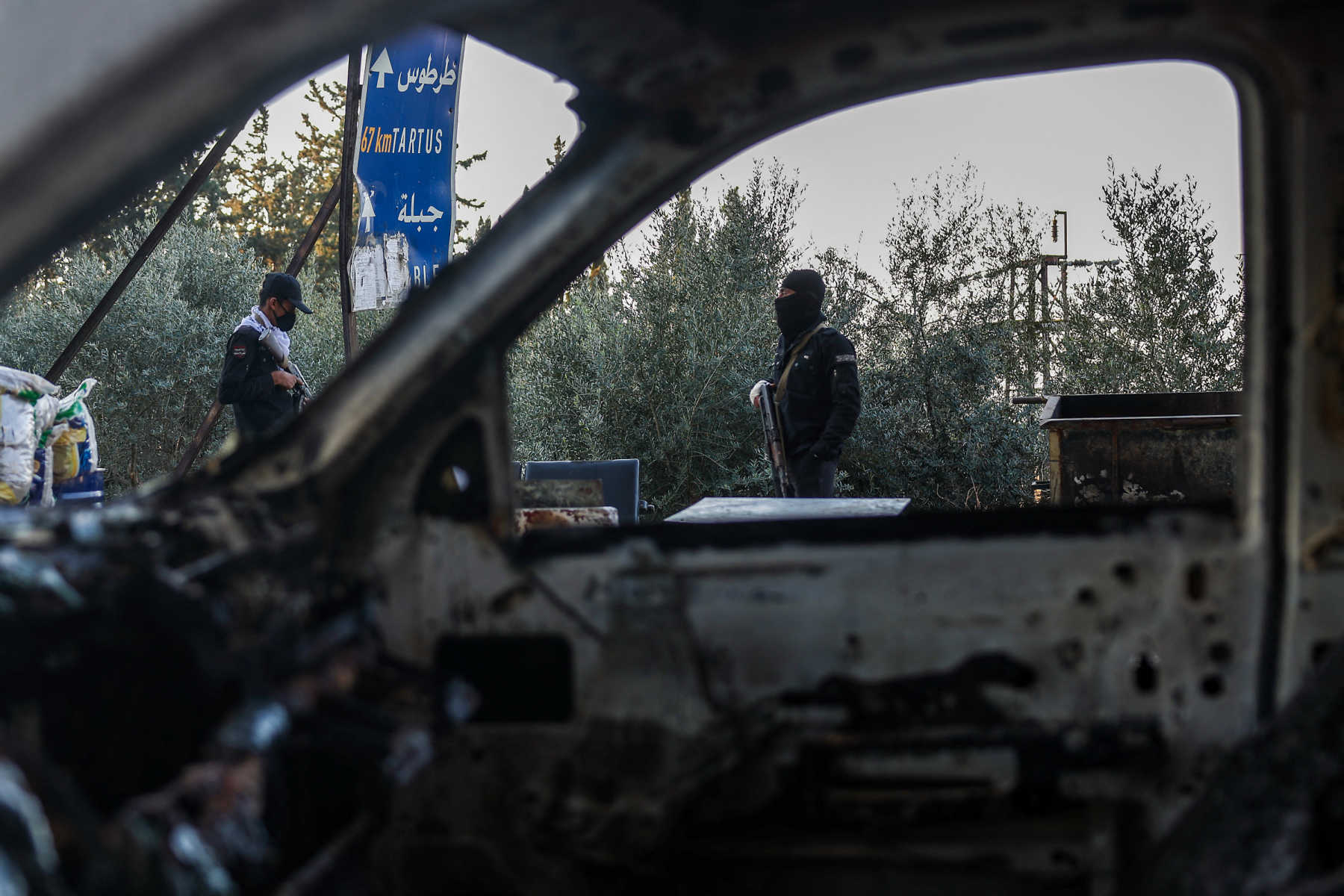Raed Jarrar is the Advocacy Director of DAWN.
The horrific bloodshed in Israel and Gaza since Saturday lays bare a grim reality: U.S. policy toward Israel and Palestine hasn't brought us an inch closer to peace. In fact, it's made things worse. At this critical juncture, President Joe Biden has a choice: stick with the same failed policies of his predecessors, or forge a new path that could finally help bring an end to these cycles of violence.
The Biden administration has continued a lopsided U.S. policy that has long granted Israel not just a right to "self-defense," but what effectively amounts to a right to oppress. The U.S. has not only stood by Israel through decades of expansionist policies over occupied Palestinian territory, but has been its chief patron and financier, providing billions in military aid each year. This is not neutrality; this is complicity.
The Biden administration has taken some commendable steps, such as resuming humanitarian aid to the Palestinians that the Trump administration cut off, but these are Band-Aid solutions. Rather than continue down this road, Biden has a chance to reposition the U.S. as a genuine broker for peace.
U.S. policy toward Israel and Palestine hasn't brought us an inch closer to peace. In fact, it's made things worse.
- Raed Jarrar
This starts with brokering an immediate cease-fire. No more words. No more delays. Lives are at stake, and each moment of indecision leads to more unnecessary suffering.
Next, a prisoner swap. Such a humanitarian gesture could save the lives of the estimated 150 hostages and prisoners being held by Hamas in Gaza, and prevent even more Palestinian and Israeli lives from being lost in this war. A prisoner swap is not a novel idea; it's been done before, including under a previous Netanyahu government, and it can help de-escalate tensions.
It's also long past time to open a dialogue with all elected Palestinian groups, however stale their mandate has been since the last Palestinian elections a staggering 17 years ago. This means direct negotiations with Hamas, which is the governing body in Gaza—a reality that Washington must acknowledge, however reluctantly. Ignoring a political faction may suit some short-term goals, but accomplishing a long-lasting peace requires bringing everyone to the table.
All this should go hand-in-hand with a firm commitment to end U.S. support for Israeli policies that smack of apartheid and violate international law. As long as America continues to bankroll Israel's military campaigns and fails to criticize its actions, we're not brokers for peace; we're enablers of conflict and suffering.
But what if the U.S. remains obstinate, simply backing Israel no matter what? What's at risk? At best, we're looking at a never-ending cycle of violence that keeps the region in turmoil and extremists on both sides in business. At worst, we're risking a regional war, bringing in at least Lebanon and perhaps eventually Iran. Either way, America will lose its credibility, further eroding its ability to lead globally. And let's not forget, Washington would be bankrolling this chaos with more and more military aid to Israel, wasting American taxpayers' money on an pointless conflict that can be avoided.

If the Biden administration isn't willing to take these steps, then it should step aside and let others take the lead. Get the United Nations involved more aggressively. Stop using America's veto power at the U.N. Security Council to shield Israel from accountability. If required, deploy U.N. peacekeeping forces—blue helmets—to maintain stability and protect civilians, like they do in southern Lebanon.
The International Criminal Court also has a crucial role to play in holding all parties accountable for potential war crimes and fostering an environment for peace. Targeting civilians is a war crime under the Rome Statute, the ICC's governing treaty, and the ICC has jurisdiction over the Gaza Strip, West Bank and East Jerusalem. Just as the ICC has deployed investigative teams to Ukraine to probe alleged war crimes since Russia's invasion, the court should apply similar urgency to this conflict. An immediate deployment of investigators and forensic experts could serve as a powerful deterrent against further violence and atrocities, offering a path toward justice for the victims in both Israel and Gaza.
In his address from the White House on Tuesday, Biden offered his full-throated support for Israel. There was no message urging Israeli "restraint" in Gaza or calling for a cease-fire. It wasn't just a missed opportunity; it was effectively a renewal of the administration's blank-check policy to Israel.
There's no shame in admitting that a policy isn't working. The shame lies in continuing a disastrous strategy when new paths, fraught as they may be with political risk, beckon. This violence will erupt again and again as long as the policies fueling it continue. It's time to take a different road, one less traveled by previous U.S. administrations, but one that leads to a destination desperately yearned for: a just and lasting peace, finally, between Israelis and Palestinians.
If Biden really wants to change the region's prospects, he should confront the problem directly in front of him: the unsustainable situation in Israel and Palestine.
- Raed Jarrar
Up until the past few days, Biden's sole priority in the region, it seemed, was brokering a normalization agreement between Israel and Saudi Arabia—building on the flawed Abraham Accords that Trump sealed in his final months in the White House. Even though diplomatic normalization between Israel and authoritarian Arab regimes is premised on sidelining the Palestinians and ignoring the Israel-Palestine conflict itself, Biden's administration has talked it up as a "game-changer" heralding a "new" Middle East. Just last week, Biden's national security adviser, Jake Sullivan, somehow even declared that "the Middle East region is quieter today than it has been in two decades."
This narrow focus on dealmaking between Israel and Arab autocrats, while ignoring the Palestinian question and pretending it no longer mattered, created a fantasy of stability. And yet the Biden administration still seems committed to an ill-fated Israeli-Saudi bargain, paid for with U.S. security guarantees to Riyadh, with only the vaguest pledges to the Palestinians. "It would really change the prospects of the entire region far into the future," Secretary of State Antony Blinken said Sunday of Israeli-Saudi normalization, making clear the administration's priorities even in the aftermath of Hamas's attack.
If Biden really wants to change the region's prospects, he should confront the problem directly in front of him: the unsustainable situation in Israel and Palestine. A U.S. president looking to make history in the Middle East should try and achieve actual peace by ending its most entrenched conflict, rather than creating an illusion of peace that maintains the status quo at the Palestinians' expense. If he doesn't, then it's not just Israelis and Palestinians who lose; it's all of us. The old ways aren't working and will only lead to more bloodshed.

















![Security forces loyal to the interim Syrian government stand guard at a checkpoint previously held by supporters of deposed president Bashar al-Assad, in the town of Hmeimim, in the coastal province of Latakia, on March 11, 2025. Syria's new authorities announced on March 10, the end of an operation against loyalists of deposed president Bashar al-Assad, after a war monitor reported more than 1,000 civilians killed in the worst violence since his overthrow. The Syrian Observatory for Human Rights said the overwhelming majority of the 1,068 civilians killed since March 6, were members of the Alawite minority who were executed by the security forces or allied groups. (Photo by OMAR HAJ KADOUR / AFP) / “The erroneous mention[s] appearing in the metadata of this photo by OMAR HAJ KADOUR has been modified in AFP systems in the following manner: [Hmeimim] instead of [Ayn Shiqaq]. Please immediately remove the erroneous mention[s] from all your online services and delete it (them) from your servers. If you have been authorized by AFP to distribute it (them) to third parties, please ensure that the same actions are carried out by them. Failure to promptly comply with these instructions will entail liability on your part for any continued or post notification usage. Therefore we thank you very much for all your attention and prompt action. We are sorry for the inconvenience this notification may cause and remain at your disposal for any further information you may require.”](https://dawnmena.org/wp-content/uploads/2025/04/syria-22039885951-350x250.jpg)











![Security forces loyal to the interim Syrian government stand guard at a checkpoint previously held by supporters of deposed president Bashar al-Assad, in the town of Hmeimim, in the coastal province of Latakia, on March 11, 2025. Syria's new authorities announced on March 10, the end of an operation against loyalists of deposed president Bashar al-Assad, after a war monitor reported more than 1,000 civilians killed in the worst violence since his overthrow. The Syrian Observatory for Human Rights said the overwhelming majority of the 1,068 civilians killed since March 6, were members of the Alawite minority who were executed by the security forces or allied groups. (Photo by OMAR HAJ KADOUR / AFP) / “The erroneous mention[s] appearing in the metadata of this photo by OMAR HAJ KADOUR has been modified in AFP systems in the following manner: [Hmeimim] instead of [Ayn Shiqaq]. Please immediately remove the erroneous mention[s] from all your online services and delete it (them) from your servers. If you have been authorized by AFP to distribute it (them) to third parties, please ensure that the same actions are carried out by them. Failure to promptly comply with these instructions will entail liability on your part for any continued or post notification usage. Therefore we thank you very much for all your attention and prompt action. We are sorry for the inconvenience this notification may cause and remain at your disposal for any further information you may require.”](https://dawnmena.org/wp-content/uploads/2025/04/syria-22039885951-360x180.jpg)







